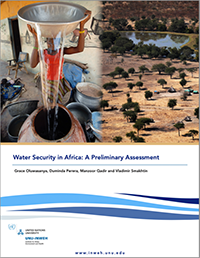|
U.N.: 500 Million Africans Lack Water Security
March 21, 2022
The U.N. defines water security as “The capacity of a population to safeguard sustainable access to adequate quantities of acceptable quality water for sustaining livelihoods, human well-being, and socio-economic development, for ensuring protection against water-borne pollution and water-related disasters, and for preserving ecosystems in a climate of peace and political stability.” According to the U.N. University's Institute for Water, Environment and Health, the countries that fell below the U.N.-defined standard for dependable water security were these:
First and foremost, many of the people highlighted do not have ready access to clean drinking water. For example, the report found that only 37 percent of people living in the Central African Republic could readily get clean drinking water. Other prime indicators of water security are access to proper hygiene and sanitation. As well, the report found that many of the countries had poor water infrastructure and/or poor water use efficiency. The U.N. had set sustainable development goals in 2015. The report found that 29 African nations had made some progress toward meeting those goals and that 25 have made none at all. The report's authors urged national governments and international agencies to cooperate in order to address the disparities identified. |
Social Studies for Kids |
Social Studies for Kids
copyright 2002–2024
David White



 Up to 500 million people in Africa live without access to water security, according to the United Nations. The first-of-its-kind report found that people in 19 of Africa's 54 countries did not have reliable access to safe drinking water.
Up to 500 million people in Africa live without access to water security, according to the United Nations. The first-of-its-kind report found that people in 19 of Africa's 54 countries did not have reliable access to safe drinking water.
